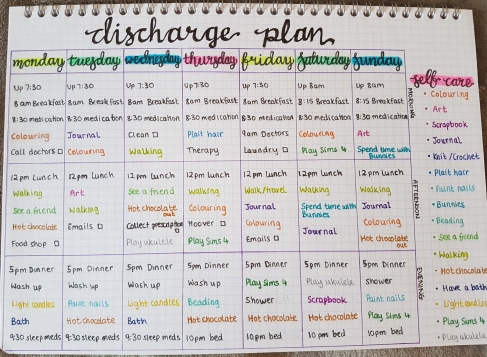Discharge. One of my least favourite words ever! I have a very persistent fear of abandonment, and struggle with ‘leaving’ and change as a result. That one word seems to encapsulate those three fears, and worse, hence my hatred of it. Nonetheless, it is an eventuality that all will inevitably face at some point. After all, no one can stay in hospital forever, even if, at times, it might feel like you’re destined to for eternity! Someone recently told me that quite unlike image of being thrown out into the cold that it evokes, the actually meaning of the word ‘discharge’ denotes more a transfer of your care, rather than a complete cessation. I much prefer the idea of a ‘transfer’ and it does ring true… Regardless of the nature of the admission, be it physical or mental health related, a hospital will never just turf you out. They have to discharge, or rather transfer, you to somewhere, whether that’s to the care of your GP, community services, or even just the care of your family or a friend.
Discharge is still a huge adjustment though. For me, it was a frustratingly confusing experience. I was absolutely desperate to get out, but at the same time parts of me were extremely unsettled by the prospect of leaving, change and just the upheaval in general. I know it doesn’t make much sense that I was struggling with leaving a place that I was desperate to leave, but within my system, it is more a case of there being triggers and anxieties associated with the act of leaving, even if we do actually want to leave! Something I’ve noticed is that there is so much shared online about the experience of being an inpatient for mental health difficulties, but little about what comes next. Reintegrating back into ‘normal life’ and all that comes with it. Returning to the same environment, issues and relationships where things may have gone downhill before. Working out who you are, where you are in life and where you’re headed after the experiences you’ve had. I’d say life after hospital is equally as challenging as life in hospital, it’s just not the bit you hear about.
I therefore want to share some tips and advice about managing and coping with discharge, based upon what I learnt from my most recent experience, in the hope that it might help someone else who is going through the same thing, and to give others more of an idea of what it is like to readjust to life outside of hospital…

P L A N & P R E P A R E
By this I mean plan and prepare as much as possible before being discharged. At the very least have a plan for what you are going to do when you get home and the following day. In an ideal world, the staff supporting you in hospital will help in the process of planning and preparing for your discharge. You’ll probably have a build up of home leave so that it will feel more like a natural transition rather than a shock to the system to be back home full time. When I was in hospital there was a What Comes Next Group, the focus of which was all about discharge and managing your mental health while living in the community. One of the things they provided at the group was a weekly planning sheet that you could use to plan how you wanted to spend your time following discharge. It was really helpful – I just didn’t expect to have to use it so soon! The reality can be, as I found out, that discharge can come round far quicker than expected. In my case, there was a sudden haste to get me off the ward as soon as possible as it was deemed an unsuitable environment for me. In circumstances like this, there can be very little time to plan and prepare. Nonetheless, there will always be somethings you can do to prepare, even if it is very last minute. It is the small things that people often overlook that can make the transition home far less stressful, like making sure that you have food in the fridge ready for your return and that you are returning to a clean and tidy environment. You might have to rope your friends and family into helping out with this, but it is definitely worth it, and people are often keen to do anything they can to help.
I T ‘ S O K A Y I F Y O U F E E L O V E R W H E L M E D
With all the best planning in the world, being discharged from hospital can still be a very overwhelming experience. Despite only having a fairly short stay in hospital on both occasions, I still found the experience of coming home extremely overwhelming. Hospital is a very particular environment with the same faces, walls, sights, smells and rules. It can feel like a bit of a sensory overload to be back out in the real world and all that comes with it. Leave from hospital in the run up to discharge can help to adjust to life outside, but there are some things that can take a bit more getting used to. There are so many rules and restrictions that govern life in hospital. I found it quite overwhelming to be back home surrounded by items that were taken off me in hospital. I had no intention of doing anything harmful or destructive with these items. It just felt weird to have those items around me again. There’s also the absence of feeling constantly observed, which can be quite a relief, but also another thing to adjust to again. With this, there can also be the absence of the support you had in hospital. On a ward, there is usually always someone readily available to talk to if you are struggling, any time of the day or night. Even with a very good support network, this is not the case for most people at home. My advice would be to make the most of the people you do have around you. You might not be able to have the same kind of conversations you could have with the staff in hospital, but you can still tell the people who care about you how you are feeling. It is okay to feel really overwhelmed. In fact, it’s perfectly understandable. Going through a mental health crisis and a hospital admission is a huge ordeal. I know with me, it’s only when I am out of a place that I begin to fully process the experience, and that’s when all the emotions come flooding out. So be kind to yourself and take things slowly. It’s okay to feel overwhelmed, but you don’t have to feel overwhelmed alone.
E D U C A T E P E O P L E ! O U T OF H O S P I T A L D O E S N O T = B E T T E R
This was a major source of frustration for me. For some reason, a lot of very well-meaning family and friends seems to think that being discharged from hospital equates to being ‘better’. They seem to expect you to spring back into life as it was before and be ‘back to normal’. Some people also think that as soon as you’re out of hospital they can start hitting you with major plans and decisions. The reality is that just because you are out of hospital, it doesn’t mean you are no longer unwell. Hospital is there to keep you safe and set you on the right path to continue your recovery in the community. The hard work really does begin at home. There have actually been studies that have shown that actually the most vulnerable time for people in terms of their mental health is the first few days following discharge from hospital! During this time, the last thing you need is people telling you that you’re better and wanting you to bounce back into life outside of hospital with them! So educate them. Explain to them that out of hospital does not equal better. Tell them how you’re feeling, that you need to take things slowly. Tell them what you need from them. I found that a lot of friends and family didn’t want to mention my stay in hospital or hear anything about it. Nonetheless, I felt it was important to tell them about what it is was like, even if they didn’t want to hear it. In my experience, people tend to judge and fear what they don’t understand. There can be so much stigma around hospital admissions for mental health that needn’t be there. Mental health doesn’t discriminate. I don’t think anyone sets out in life expecting to end up on an acute psychiatric ward. I certainly didn’t, yet it happened, twice. It really can happen to anyone. That’s why I feel it is important to talk about the experience of hospital admission as it may give others a better idea and understanding of what to expect should they face the same situation at some point.
T A K E T H E T I M E O U T Y O U N E E D T O F O C U S O N Y O U
We’ve already established that being out of hospital definitely doesn’t mean better, it’s just the start of another part of your recovery journey. So don’t expect too much of yourself. Put off life stresses and decisions as far as possible and take the time you need to focus on you and doing things that are good for you. The period following hospital admission is a very vulnerable time. It is not the time to be making big decisions, so hold off until you are ready. I find that if you explain to people that you have had a hospital admission, are still unwell, and are adjusting to life at home, they are usually understanding and are happy to hold off any big decisions for an agreed period. Inevitably, there are some life stresses that you can’t avoid or put off forever, like bills, rent contracts, prescription requests etc. If that’s the case, then try to spread these necessary, but boring, tasks out and balance them with more enjoyable activities.
K E E P U P A R O U T I N E
You don’t have to be in hospital for long to become accustomed to the routine. All of a sudden you are thrust back into life where nobody is there telling you to get up, to take your medication, that it’s meal time etc. When overwhelmed and with a lot of unstructured time on your hands, the temptation can be to hide away and bury your head in the sand. However, I find that a sense of comfort and continuity can be found in keeping up a routine. It may be helpful at first to keep up some of the routine you had in hospital – such as waking up at a particular time, taking your medication at a set time/s, keeping to meal times and also keeping up some of the daily activities that benefited you while in hospital. As time goes on, it may help though to make the most of the fact that you now have the freedom to stray from the routine, should you wish to! Enjoy a lie in if you need it. Enjoy eating what you want when you want, with no one there to tell you otherwise!
S E L F C A R E
This is such an important one! Taking some time to focus on yourself means really homing in on self care. The words ‘self care’ can often trigger idyllic notions of relaxation, meditation, face masks, incense and soaking in candle lit bubble baths. The reality is that self care can actually be really hard work. Just making sure you cover the basics can be a real struggle when suffering from a mental illness. Sometimes self care is simply making sure you’re up and dressed, clean and showered at a regular time. These basic tasks are real achievements that should be recognised and celebrated. It can help to plan in these daily self care tasks into your routine as they can often fall by the wayside when you’re in the thick of it, or life starts to get in the way. Self care can also be enjoyable. Basically, it’s just anything that is good for you and benefits your wellbeing. It could include doing creative stuff, having your hair or nails done, going out for a walk, having a chat with a friend, spending time with a pet – anything at all so long as it impacts you in a positive way. I included a list of my favourite self care activities alongside my discharge plan, almost like a menu that I could choose from day to day. I know it’s easy to slip into the mindset of self care being selfish, but it’s actually quite the opposite. In order to be able to give and care for others, we have to be able to care for ourselves first. There’s only ever going to be one of you so it’s important to look after yourself the best you can. Also, self care isn’t necessary always a lone activity. Quite a lot of the tasks and activities I’ve listed can be done with another person. In fact that might make them even more enjoyable. It may be a way to encourage others to also focus on their own self care, so beneficial all round, and definitely not a selfish pursuit at all!
G E T O U T T H E H O U S E E V E R Y D A Y
Again, when feeling very overwhelmed, the temptation can always be there to hide away from life and hibernate. It can depend how long you’ve been in hospital, but in any case, it can take time to adjust to life outside. Even normal, everyday things such as shops, supermarkets and even just a nearby street can feel strangely alien and overwhelming when you’ve been away from it all for a while. The longer you hide away, the harder it will hit you when you eventually have no choice but to venture out. So, from the get-go make it part of your routine to get out the house everyday. You don’t have to aim big… You can start off small – a walk round the block, even just a sit in the garden (if you have one), a visit to your local shop to buy a treat as a reward, venturing out further at quieter times to begin with, and my all time favourite – a walk out in nature. Going out alone can be quite daunting at first. If this is the case, then it can help to arrange to go out with someone else first, then build up from there. However near or far you venture, make the most of it! Every little trip out is an achievement and an opportunity to make new memories for yourself.
E N J O Y Y O U R F R E E D O M
I’ve touched on this a bit earlier, but my main advice for approaching life post-hospital is to enjoy it! Enjoy your freedom and make the most of doing all the things you couldn’t do in hospital. For me, this consisted of…
- Spontaneous evening beach walks – the first one post-hospital felt amazing!
- National Trusting adventures
- Baths with bath bombs (only a shower in hospital)
- Seeing animals at a farm
- Spending time with my bunnies
- Privacy – being able to lock doors!
- Doing art and crafts activities to my heart’s content without having to be supervised
- Having the freedom to go out where I want, when I want, without having to tell people exactly where I’m going, what I’ll be doing, when I’ll be back and having to fill out a form every time!
You probably get the picture! When I’m feeling well in myself, I’m not a fan of being penned in. It sounds a bit cheesy, but beyond hospital, there really is a whole world out there waiting to be explored. So be a part of it and make the most of it!
R E A C H O U T F O R S U P P O R T
I’m hoping this is becoming a bit of a theme running throughout. Life post-hospital can be amazing, exciting, mundane, dull, overwhelming, frustrating, all at once, but it’s not an experience you should feel you have to face alone. Allowing others to be a part of your journey can help you through the hard times, but can also make the good times even better! Reaching out for support isn’t a sign of neediness or weakness, it’s a sign of strength and wellness – it shows that you really want to make this work. I always find that in situations like this friends and family have a habit of saying, “Let me know if there’s anything you need, or if there’s anything we can do to help”. It can feel a bit perplexing when they only thing you need or want from them is simply for them to be there for you. In my experience, most (genuine) people really want to help, but have no idea what to say or do, or are desperately worried they’ll say or do the wrong thing. So be clear – tell them what you need from them even if it’s just something as simple as for you to chat to them when you’re struggling and for them to listen. They offered to help after all, so take them up on it! There comes a time in everyone’s lives where people need more support than others. So be there for each other.
D O C U M E N T Y O U R J O U R N E Y
Journal. Write. Draw. Take photos. Scrapbook. Use whatever means you have to document as much or as little as you want of your life and journey post-hospital. All these things can be great to look back on. Seeing all the new memories you’ve made and just how far you’ve come can help you through the darker times…




I T ‘ S O K A Y I F Y O U S T R U G G L E
Recovery isn’t linear. It’s been said so many times, but it’s definitely true! The transition out of hospital back into the community is a really hard one. Personally, on both occasions, I found the first few months after discharge the most challenging periods in terms of my mental health. It almost felt like that was when the real battle commenced. Honestly… The amount of times I’ve struggled with suicidal thoughts and urges post-hospital – lost count. The amount of times I’ve thought I might be heading back to hospital – lost count. Life doesn’t run smoothly. There are always unexpected obstacles getting in the way. However, by simply continuing to be, even when the going gets tough, and you’re not sure you want to, you overcome them. As it happens, I am heading back to hospital, but to work there. I guess that really is proof that you never know where life is going to take you next! When I have struggled post-hospital, I’ve often been quite reluctant to reach out for support as I’ve worried that I would be letting other people down, that I ‘should’ be able to cope ‘better’ than this by now, that they will expect me to be ‘better’ by now. What I’ve learnt is that people would feel even more let down to discover that you were struggling and didn’t tell them. If struggling means that your journey takes you back to hospital, then that’s hard, but so be it. It’s not a failure. It’s just another chapter in your story that was always meant to be there.
The life that’s waiting up for you post-hospital may be hard, but there’s no doubt that it will be worthwhile.
Lorna ♥
